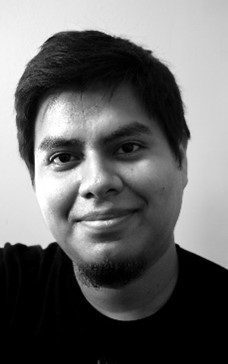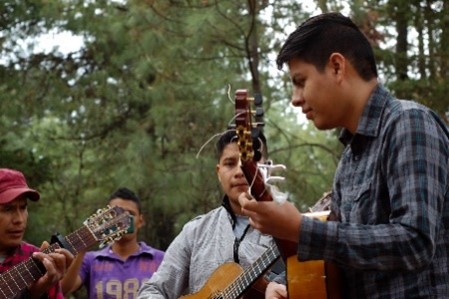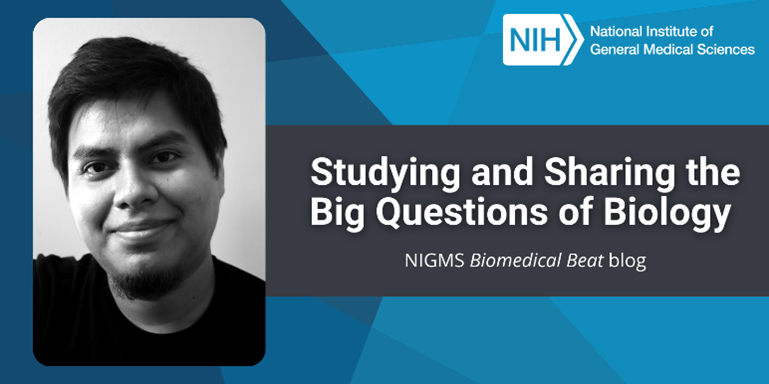
When he started high school in Mexico, Pedro Márquez-Zacarías, Ph.D., wanted to be a politician. However, as he became aware of issues like corruption, he began looking into other fields. Chemistry fascinated him, so he enrolled in a class at his school that was later canceled partway through the year. He then joined a biology class because it included a unit on biochemistry, and through that experience, found that he enjoyed other aspects of biology as well—so much so that he went on to compete in the International Biology Olympiad, a competition for high school biology students.
After graduating from high school, Dr. Márquez-Zacarías majored in biomedical sciences at Universidad Nacional Autónoma de México and discovered a passion for ecology and evolution. During a class activity where students had to present scientific papers, the work of evolutionary biologist William Croft Ratcliff, Ph.D. riveted him. Dr. Márquez-Zacarías began an email conversation with Dr. Ratcliff that led to visiting his NIGMS-supported lab at the Georgia Institute of Technology (Georgia Tech) in Atlanta.
Dr. Márquez-Zacarías ultimately joined the first cohort of the quantitative biosciences graduate program at Georgia Tech working in Dr. Ratcliff’s lab. For his Ph.D. research, he developed theories to understand how multicellular organisms have become more complex and how populations of microbes are structured spatially, which can help explain the formation of biofilms. He plans to continue focusing on theoretical biology—a field devoted to creating mathematical models of biological phenomena.
Sharing Science
Dr. Márquez-Zacarías’ interest in science communication started in high school, and he became more involved during his time at Georgia Tech. In collaboration with Ph.D. student Jennifer Rattray, he started a bilingual (English and Spanish) blog for both lay readers and biologists called Biomusings in 2020. It aims to explore the “big questions” of biology, such as how to define life. “It’s important to have scientists express not only what they know but also what they don’t,” says Dr. Márquez-Zacarías. He’s taken a break from working on Biomusings but plans to refocus his efforts on it to share important aspects of biology that are rarely presented to the public.
In July 2021, Dr. Márquez-Zacarías began an early career science journalism fellowship through The Open Notebook, where he received mentoring in science communication and authored articles. “The fellowship was very good for me personally and professionally. I didn’t realize how similar science journalism was to scientific research,” Dr. Márquez-Zacarías says. He compares a story idea to a scientific hypothesis and explains that as you gather information and write, sometimes you “disprove your hypothesis,” discovering things that change the direction of the story.
In addition to publishing his work on Biomusings and The Open Notebook, Dr. Márquez-Zacarías authored an opinion piece titled “Lessons for Aspiring STEM Grad Students,” published in Scientific American. It was important to him to pass on the knowledge he gained and support other people interested in scientific careers. This belief led him to help mentor and prepare students from his high school for the International Biology Olympiad over the 5 years after he competed himself until he graduated college and left Mexico.
He also taught STEM classes at Freedom University in Atlanta from 2018 until his graduation in summer 2022. Freedom University helps undocumented immigrants, who often struggle to access higher education in the United States, by providing free college-prep classes and assistance applying to schools and scholarship opportunities. “I don’t see teaching at Freedom University as service. I’ve gained more from the students than I possibly could have given them. They were a source of joy during my years as a Ph.D. student,” says Dr. Márquez-Zacarías. Several students he taught are now pursuing science degrees.
Looking Forward

In October 2022, Dr. Márquez-Zacarías will start a postdoctoral fellowship at the Santa Fe Institute in New Mexico. He plans to develop theories about life cycles and biological autonomy as well as investigate the evolution of the Purépecha language, which is spoken in Michoacán, Mexico, and has no known relationship to any other language. Dr. Márquez-Zacarías is a member of the Purépecha culture, and he’s excited to use his research skills to deepen his relationship with his culture’s language.
Dr. Márquez-Zacarías hopes to make teaching biology and communicating science to the public part of his career in the long term. He’s still contemplating exactly what path he’ll pursue, but the uncertainty doesn’t bother him. “Science is, I think, the antithesis of certainty. You have to be comfortable with uncertainty to be a successful scientist,” he says.
Dr. Márquez-Zacarías’ Ph.D. research was supported by Dr. Ratcliff’s NIGMS grant, R35GM138030.


